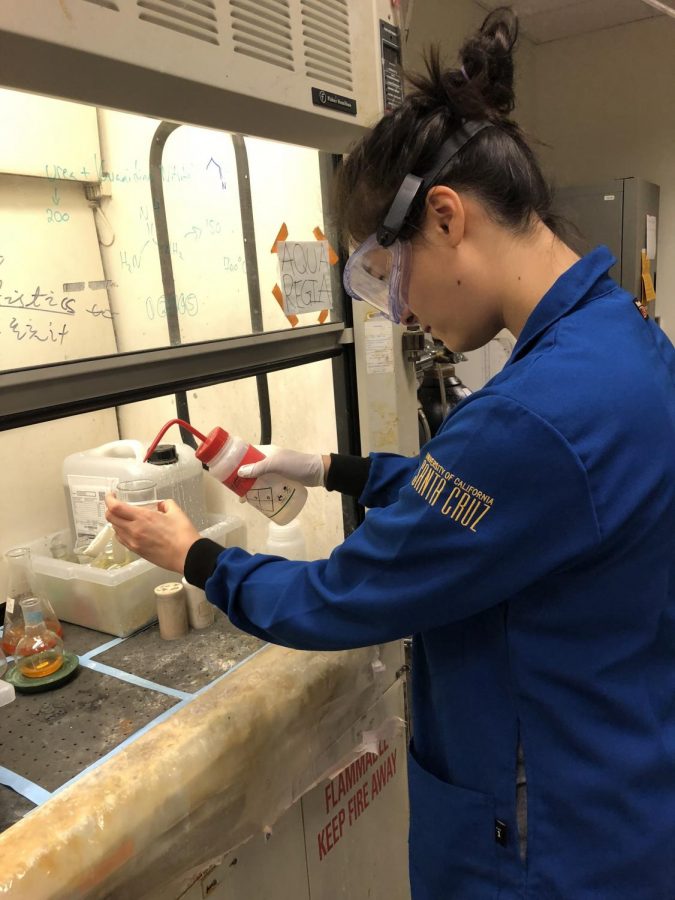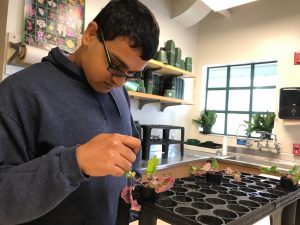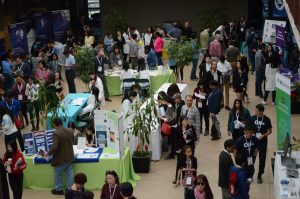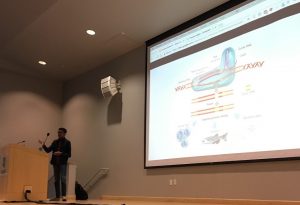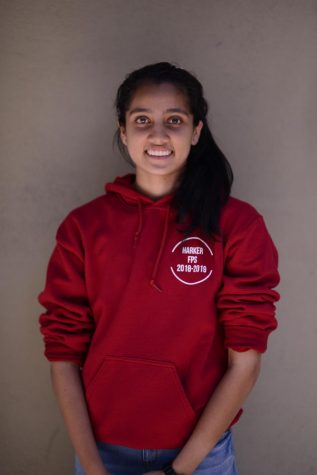Summer research internships create new opportunities for student researchers
Allison Cartee
Allison Cartee (12) performs a chemistry experiment under a glass hood at UC Santa Cruz. Allison was a member of the Summer Internship Program (SIP) at UCSC and spent ten weeks performing research under the guidance of a mentor.
September 3, 2018
Over the past summer, students participated in various research projects at locales ranging from local companies to startups to academic institutions such as Stanford University and University of California at Santa Cruz (UCSC).
Students looking to participate in UC Santa Cruz’s Summer Internship Program (SIP), one research program designed for high schoolers, first apply through Harker. A committee then selects the group of students whose applications are submitted to SIP. After a second round of screening by the SIP staff, accepted students are matched with mentors based on their interests in 14 disciplines.
SIP has grown from three students to 160 in the past decade. This year, 165 students were selected from a pool of nearly 700 applicants. Dr. Raja GuhaThakurta, founder and director of SIP, explained why he believes there is an increase in interest for summer research internships.
“You can learn fantastic techniques, you can tackle open ended research and you can work very closely alongside lots of people who have experience doing this,” Dr. GuhaThakurta said. “Those have been the three pillars of SIP – open ended problem solving [while] practicing critical thinking, learning sophisticated skills and being closely mentored by professional researchers.”
While some students worked as part of an internship program, others found their summer internships through emailing professors at various labs, asking to work under their mentorship for the summer and beyond.
“I basically emailed around for the certain research area I was interested in at local universities and companies around the area,” Joshua Broweleit (12) said. “I showed them my background of my previous research projects and … told them how their research and my interests would work really cool together, and it took off from there. I [interned] at Stanford and I was really happy there.”
Some students had remarkable research experiences that defied their initial expectations. Senior Kelsey Wu participated in an internship at Stanford University to help create strength-based assessments for individuals with autism and had a unique opportunity through her research.
“Because of my interest in psychiatry and human behavior, I founded a choir for individuals with autism in 2014 and have been working with the choir ever since, which really helps on my personal interactions with the children, ” Kelsey said.
Dr. GuhaThakurta also encouraged students to try to identify what fields of study bring them the deepest enjoyment or pique their interest the most while searching for a fulfilling research experience.
“I am asking people to really look at themselves and not look at other people’s expectations of them,” Dr. GuhaThakurta said. “We are not born with these passions and sense of what we enjoy. We are shaped by our environment and there is no denying that – we are shaped by our parents and other adults around us but that has to be balanced with one’s inner spirit and what one is passionate about.”
Aarzu Gupta (11), who has been passionate about research since middle school and participated in research at the University of California at San Francisco over the summer, shared some advice her for future participants based on her experiences.
“Even if you’re not very interested in a subject, if you find some area fascinating, I would say that research is a great way to explore and delve deep into that area and find out whether you really enjoy it or not,” Aarzu said. “Don’t be afraid to reach out to different mentors or PIs [principal investigators] or even lab assistants as most people are very willing to take in people who have very limited experience as long as they show that they’re passionate about a subject.”
This piece was originally published in the pages of The Winged Post on Aug. 31, 2018.
Correction: September 3, 2018
A previous version of this article incorrectly stated that there were 1,200 SIP applicants. The article has been edited to correct this error.


















![“[Building nerf blasters] became this outlet of creativity for me that hasn't been matched by anything else. The process [of] making a build complete to your desire is such a painstakingly difficult process, but I've had to learn from [the skills needed from] soldering to proper painting. There's so many different options for everything, if you think about it, it exists. The best part is [that] if it doesn't exist, you can build it yourself," Ishaan Parate said.](https://harkeraquila.com/wp-content/uploads/2022/08/DSC_8149-900x604.jpg)




![“When I came into high school, I was ready to be a follower. But DECA was a game changer for me. It helped me overcome my fear of public speaking, and it's played such a major role in who I've become today. To be able to successfully lead a chapter of 150 students, an officer team and be one of the upperclassmen I once really admired is something I'm [really] proud of,” Anvitha Tummala ('21) said.](https://harkeraquila.com/wp-content/uploads/2021/07/Screen-Shot-2021-07-25-at-9.50.05-AM-900x594.png)







![“I think getting up in the morning and having a sense of purpose [is exciting]. I think without a certain amount of drive, life is kind of obsolete and mundane, and I think having that every single day is what makes each day unique and kind of makes life exciting,” Neymika Jain (12) said.](https://harkeraquila.com/wp-content/uploads/2017/06/Screen-Shot-2017-06-03-at-4.54.16-PM.png)








![“My slogan is ‘slow feet, don’t eat, and I’m hungry.’ You need to run fast to get where you are–you aren't going to get those championships if you aren't fast,” Angel Cervantes (12) said. “I want to do well in school on my tests and in track and win championships for my team. I live by that, [and] I can do that anywhere: in the classroom or on the field.”](https://harkeraquila.com/wp-content/uploads/2018/06/DSC5146-900x601.jpg)
![“[Volleyball has] taught me how to fall correctly, and another thing it taught is that you don’t have to be the best at something to be good at it. If you just hit the ball in a smart way, then it still scores points and you’re good at it. You could be a background player and still make a much bigger impact on the team than you would think,” Anya Gert (’20) said.](https://harkeraquila.com/wp-content/uploads/2020/06/AnnaGert_JinTuan_HoHPhotoEdited-600x900.jpeg)

![“I'm not nearly there yet, but [my confidence has] definitely been getting better since I was pretty shy and timid coming into Harker my freshman year. I know that there's a lot of people that are really confident in what they do, and I really admire them. Everyone's so driven and that has really pushed me to kind of try to find my own place in high school and be more confident,” Alyssa Huang (’20) said.](https://harkeraquila.com/wp-content/uploads/2020/06/AlyssaHuang_EmilyChen_HoHPhoto-900x749.jpeg)



